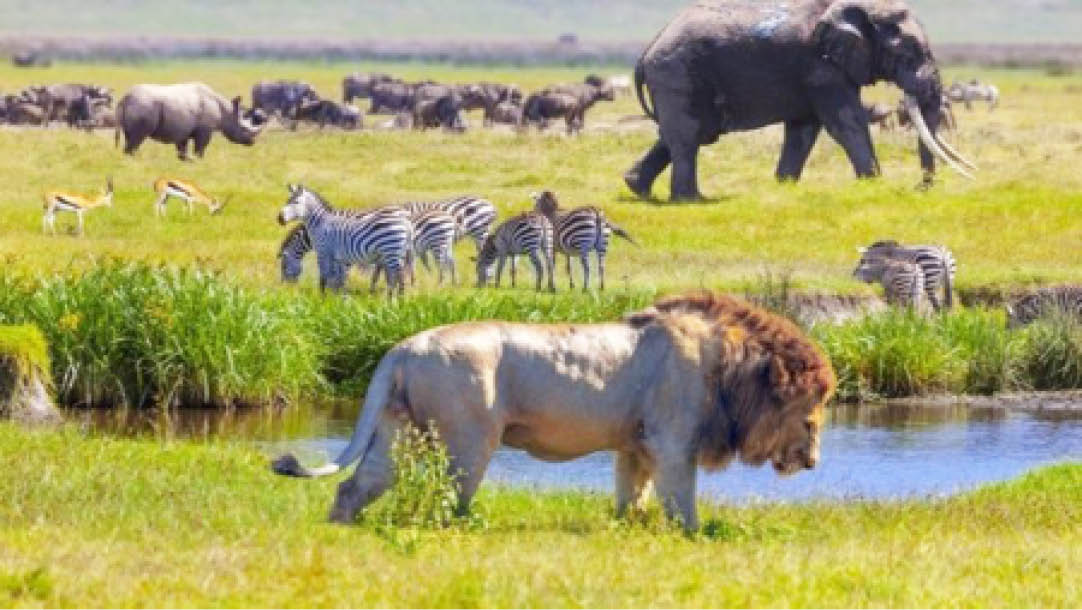Nigeria has joined the rest of the world to mark the 2024 World Wildlife Day, which is to celebrate the many beautiful and varied forms of wild fauna and flora and to raise awareness of the multitude of benefits that their conservation provides to people.
Also, the day reminds leaders and the people of the continents of the urgent need to step up the fight against wildlife crime and human-induced reduction of species, which have wide-ranging economic, environmental and social impacts.
On 20 December 2013, the 68th session of the United Nations General Assembly decided to proclaim 3 March as World Wildlife Day to celebrate and raise awareness of the world’s wild fauna and flora.
It is no news that people everywhere rely on wildlife and biodiversity-based resources to meet their daily needs such as food, fuel, medicines, housing, and clothing and more importantly as a source of livelihood for many, especially in the developing nations.
- Nasarawa estate named after Shettima
- Bandits kidnap 30 villagers in Kaduna, return to Kuriga 5 days after
As a result of over dependence on the benefits and the beauty that nature, particularly wildlife brings to the people, they have become threatened as a result of poaching, illegal trade among others and thus, leading many to extinction.
Protected areas in Nigeria that significantly contribute to wildlife conservation are now also under threat as many such as the National Parks are being invaded by criminal elements who harvest and deal in illegal wildlife trades.
The theme for World Wildlife Day 2024 is “Connecting People and Planet: Exploring Digital Innovation in Wildlife Conservation.” This theme highlights the potential of digital technologies to support and enhance wildlife conservation efforts in various ways.
Speaking at an event to mark the day in Nigeria on Tuesday in Abuja, Country Representative for United Nations Office on Drugs and Crime (UNODC), Nigeria, Oliver Stolpe said findings from the Wildlife Chapter of UNODC’s Organised Crime Threat Assessment for Nigeria published in 2023 found that Nigeria is a key transit hub and consolidation point for various forms of illegal trade in wildlife and forest products, especially for pangolin, ivory and rosewood.
He said these products are sourced both from Nigeria and other countries in the region including Cameroon, Gabon, the Central African Republic, the Democratic Republic of Congo, Liberia, Cote d’Ivoire and Benin Republic.
“According to UNODC’s World Wildlife Seizures Database, there are more than a 1000 records between 2011 and 2020 which indicate Nigeria as a source, transit or destination country, or where the offender was a Nigerian national,” he said.
According to him, the assessment also provided other interesting insights into the illegal wildlife trade, saying, the research found that increased enforcement activities at the Apapa Port may be responsible for traffickers now increasingly using other Nigerian ports.
The report further identifies border towns like Gaya in Niger, located close to the borders of both Nigeria and the Benin Republic, as a strategic site where wildlife products like elephant ivory and pangolin scales are kept prior to their import into Nigeria.
He said traffickers take advantage of festive and harvest seasons to move these illegal wildlife products, as authorities are less likely to search trucks during these high-volume periods when large quantities of animals and foodstuffs need to reach their destinations quickly.
Another finding of the research suggested that armed groups are increasingly involved in the illegal harvesting and trafficking of rosewood, with nine park rangers losing their lives in violent encounters with persons involved in illegal logging in the Gashaka-Gumti National Park.
He said in general, it appears that illegal logging activities continue, despite the 2018 trade suspension of rosewood from Nigeria.
While noting that it is critical to understand what further steps might be required in order to tackle the illegal trade in wildlife and forest products, he said laws and law enforcement will not be able to deliver solutions as long as they do not manage to (re-) instill the love of nature in Nigerians.
It is however, important to note that people have also been working together to make sure the ecosystems are restored and able to thrive and plant and animal species are able to exist for future generations.
An expert, Almami Dampha told Daily Trust that Africa is estimated to lose over $17 billion in revenue annually as of the last two years as a result of the illegal trade as the African forest’s cover is disappearing faster than anywhere else in the world.
He said the corruption is more “Pervasive, transcontinental, systemic, ruthless and done on an industrial scale in the natural resources sector including our forests, fisheries and wildlife.
In his remark, the Minister of Environment, Balarabe Abbas Lawal said they must recognise the critical importance of leveraging digital solutions to address the myriad of challenges facing the planet’s ecosystems notably combating illegal wildlife trade, mitigating habitat loss, tackling the impacts of climate change among others.
He said by leveraging innovative solutions, they not only amplify their capacity to protect endangered species but also foster greater connectivity between people and the planet they call home.
Lawal said the federal ministry of environment has been in the forefront in ensuring the protection and conservation of Nigeria’s rich biodiversity of wild fauna and flora through the full protection of listed endangered species through the ESA Act and National Park Service Act through protection, awareness creation against wildlife killings.
He said other steps taken to address the challenge include establishment of Wildlife Law Enforcement Task Force (WLETF), quarterly meetings among critical stakeholders in combating illegal wildlife trade and Compliance Assistance Programme(CAP)through CITES to establish an electronic permitting system and collaboration with frontline organizations in combating illegal wildlife trade such as Customs, EFCC, INTERPOL, ICPC, NFIU among others.
Meanwhile, the Secretary-General of the United Nations, António Guterres said human activities have devastated their wildlife and that human ingenuity can help to save it.
He said: “Pollution, climate chaos, habitat loss, and exploitation of nature, have pushed a million plant and animal species to the brink of extinction. This is horrifying in itself. It is also a direct threat to the health and livelihoods of billions of people around the world, particularly the most vulnerable.”
He said this year’s theme of World Wildlife Day “Reminds us, digital technologies can help to turn things around. Already, satellites are helping to track animals under threat. And data is charting wildlife migration and land use, supporting efforts to protect them.
“When used responsibly, sustainably and equitably, digital technologies have the potential to revolutionise conservation. But they are a tool in our arsenal, not a silver bullet. We still need concerted efforts by countries, companies, and individuals to help pull the world’s wildlife back from the brink and build a just, sustainable future,” he said.
Gutierrez said at this year’s Summit of the Future, Member States will discuss proposals to develop new metrics to complement gross domestic product.
“Activities like overfishing and forest clearance increase GDP while devastating nature. Complementary metrics can provide balance, by measuring the things that really matter to people and the planet,” he said.
He urged countries to take urgent action to drastically reduce emissions, adapt to climate extremes, prevent pollution, and put the brakes on biodiversity loss, including recognising the role indigenous peoples’ play in protecting biodiversity.
The UN Secretary General said developed countries must invest in biodiversity and climate action in developing countries. “And all governments must create new national climate plans that align with limiting global temperature rise to 1.5 degrees Celsius, as well as national biodiversity strategies that implement the Kunming-Montreal Global Biodiversity Framework.”
“We depend on nature. Let’s show that nature can depend on us – and act now to protect it,” he said.

 Join Daily Trust WhatsApp Community For Quick Access To News and Happenings Around You.
Join Daily Trust WhatsApp Community For Quick Access To News and Happenings Around You.



